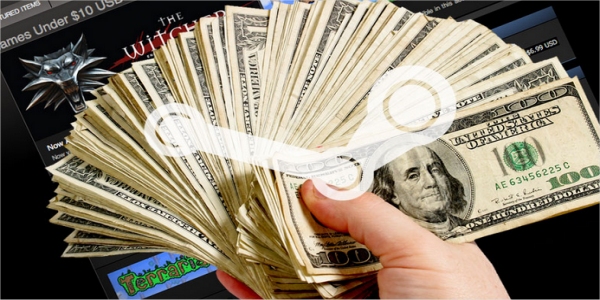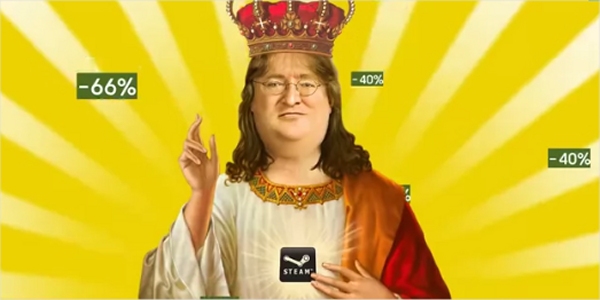How Digital Resale Could Work For Steam

With the VZBV going headlong into a court battle with Valve over the Steam subscriber policy that prevents the digital resale of games, the conversation revolving around digital resale has taken on a life of its own. Some believe that used digital games could destroy the balance of the market, while others believe it could help strengthen it. Here's a quick outlook on how the whole thing could work to the benefit of everyone.
First of all, if the VZBV wins in court against Valve it will have more of an impact on the entire digital ecosystem than just Valve and their online portal. Expect to see sweeping changes made to most outlets, including, but not limited to, Origin, Uplay, GamersGate and Impulse.
When gamers purchase a title and later decide to give it away or sell it to someone, the platform holder can implement a very convenient feature that allows users to resell games at a minimum price, with a platform fee that also sends a percentage to the developer/publisher. In essence, trading games would be identical to Steam's new Trading Card system, which operates on a very similar set of principles.
Now, some people believe that allowing resale via digital distribution would diminish the value of events like the Steam Holiday/Summer Sales. However, there's no reason why the sales would go away given that the trade of digital games would only extend as far as the people who already bought the game and decided to sell it. In other words, new games recently made available that are heavily discounted during Steam sales would not have a large enough base for used games to over-saturate or undercut the value of the release. That's not to mention that lesser-known games would still benefit greatly from the Steam sales.
Another issue some gamers brought up is that publishers and developers would no longer want to deal with Steam if resale became an option (though for companies like EA and Ubisoft, they would still have to deal with this issue if the law came down on the side of consumers given that Uplay and Origin would face the same mandates). However, this could – unlike the physical market – benefit the developers (especially indie developers) by allowing them to have a small percentage of the transfer fee. It's not necessary but it's still an option for those who feel that developers should receive money when you're cleaning out your software library.

In addition to the above, publishers and developers would still benefit from DLC. One way of limiting the exploitation of peer-to-peer trading is by ensuring that reselling a game with DLC only makes the game itself viable for resale without the DLC. So if someone decided to buy Sleeping Dogs and they also purchased several packs of DLC, if the person decided to resell Sleeping Dogs they could do so but only the license for the original game would be applicable for resale.
All the DLC the original owner purchased would not be included with the resale license since it would be considered an auxiliary form of service content. This would allow publishers and developers to still make money off DLC from game copies that were sold/transferred to another user who didn't directly purchase from a digitally licensed vendor.
Your Daily Blend of Entertainment News
For those who would rather not partake in any sort of monetary transfer for their licensed games, the option of license transfers could be made available similar to Steam's gifting option. The only difference is that you would be “gifting” a game from your library and transferring the license to a new holder. This alleviates the problem of those who would want to give away certain games to friends/family without having to actually partake in license trading fees, etc., and would be the equivalent of someone giving a hard-copy game to someone.
Anyone absolutely worried about this kind of resale option diminishing the value of digital goods and undercutting the current value of AAA, indie games and mid-budget titles in the digital distribution space, Valve, EA, Ubisoft, GamersGate and GameStop (amongst others) could easily implement minimum resale fees to ensure that digital trades during a certain period of a game's shelf life only sells for a certain amount from a peer-to-peer trade through their digital service; setting up something like a percentage threshold for newer titles. So, for instance, if a game like Tomb Raider launches digitally for $60, and someone bought it and didn't like it, they could resell the title but at a minimum of $40 within the eight week launch window. As the lifespan of the game wears on, the digital resale ceiling lowers. Everyone wins.
The only thing that would most certainly need to change are third-party DRM systems that require additional license activation, such as Uplay's DRM for Steam games, the additional DRM that Gearbox or Rockstar employs, as well as other AAA publishers who force users to re-apply their license key after purchasing and installing the game from a digital distributor.
Of course, this is all conceptual and we don't even know if the VZBV will win in their court case against Valve. If they do, it could be a huge win for gamers and it would certainly open the doors for more consumer friendly options dealing with ownership and trading mandates, especially from the less consumer-friendly digital distributors out there.
Still, I think we're all ready for a little digital resale miracle.
Staff Writer at CinemaBlend.

